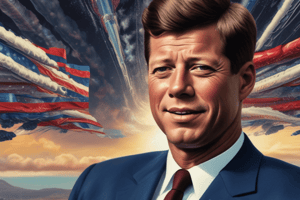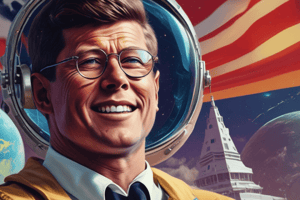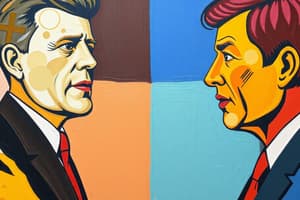Podcast
Questions and Answers
What was the main focus of Kennedy's presidency?
What was the main focus of Kennedy's presidency?
- Military affairs
- Domestic affairs
- International affairs (correct)
- Economic affairs
What was Kennedy's position on the Labor Management Relations Act of 1947?
What was Kennedy's position on the Labor Management Relations Act of 1947?
- He opposed it (correct)
- He supported it
- He was neutral
- He had no opinion
Who was Kennedy's vice presidential nominee?
Who was Kennedy's vice presidential nominee?
- Lyndon B. Johnson (correct)
- Hubert Humphrey
- Richard Nixon
- Adlai Stevenson II
What was the main goal of the Apollo program during Kennedy's presidency?
What was the main goal of the Apollo program during Kennedy's presidency?
What was the purpose of the Peace Corps created by Kennedy?
What was the purpose of the Peace Corps created by Kennedy?
What was the Strategic Hamlet Program implemented in Vietnam?
What was the Strategic Hamlet Program implemented in Vietnam?
Who did Kennedy defeat in the presidential election of 1960?
Who did Kennedy defeat in the presidential election of 1960?
What was Kennedy's stance on African nationalism?
What was Kennedy's stance on African nationalism?
What was the outcome of the Bay of Pigs Invasion?
What was the outcome of the Bay of Pigs Invasion?
Flashcards
John F. Kennedy
John F. Kennedy
35th U.S. President, serving from 1961 until his assassination in 1963.
Bay of Pigs Invasion
Bay of Pigs Invasion
Failed 1961 invasion of Cuba by CIA-trained Cuban exiles.
Cuban Missile Crisis
Cuban Missile Crisis
A confrontation between the United States and the Soviet Union in 1962 over the presence of missile sites in Cuba.
Alliance for Progress
Alliance for Progress
Signup and view all the flashcards
Peace Corps
Peace Corps
Signup and view all the flashcards
Vietnam Involvement
Vietnam Involvement
Signup and view all the flashcards
Strategic Hamlet Program
Strategic Hamlet Program
Signup and view all the flashcards
Kennedy's WWII service
Kennedy's WWII service
Signup and view all the flashcards
Cape Cod National Seashore bill
Cape Cod National Seashore bill
Signup and view all the flashcards
Study Notes
Life and Presidency of John F. Kennedy
-
John F. Kennedy was the 35th president of the United States, serving from 1961 until his assassination in 1963.
-
He was the youngest person to assume the presidency by election and the youngest president at the end of his tenure.
-
Kennedy represented Massachusetts in both houses of the U.S. Congress prior to his presidency.
-
Kennedy's administration included high tensions with communist states in the Cold War, including the Cuban Missile Crisis.
-
He authorized numerous operations to overthrow the Cuban government of Fidel Castro, including the failed Bay of Pigs Invasion in April 1961.
-
He also signed the first nuclear weapons treaty in October 1963 and supported the civil rights movement.
-
Kennedy presided over the establishment of the Peace Corps, Alliance for Progress with Latin America, and the continuation of the Apollo program with the goal of landing a man on the Moon.
-
Kennedy was born into the prominent Kennedy family in Brookline, Massachusetts, and graduated from Harvard University in 1940.
-
During World War II, he commanded a series of PT boats in the Pacific theater and was a war hero.
-
Kennedy's assassination in Dallas on November 22, 1963, was followed by the assumption of the presidency by Lyndon B. Johnson.
-
Lee Harvey Oswald was arrested for the assassination, but conspiracy theories about the assassination still persist.
-
Congress enacted many of Kennedy's proposals, including the Civil Rights Act of 1964 and the Revenue Act of 1964 after his death.John F. Kennedy's Military and Political Career
-
Kennedy served in the Pacific theater during World War II, commanding three PT boats, including PT-109 which was cut in half by a Japanese destroyer.
-
Kennedy led his crew to safety after the attack, making a two-mile swim to Ferguson Passage to hail a passing American PT boat to expedite their rescue.
-
Kennedy was awarded the Navy and Marine Corps Medal and the Purple Heart for his heroic actions.
-
After the war, Kennedy worked briefly as a journalist, covering the Potsdam Conference in Berlin.
-
Kennedy served in the House of Representatives for six years, joining the Education and Labor Committee and the Veterans' Affairs Committee.
-
Kennedy focused on international affairs, supporting the Truman Doctrine and opposing the Labor Management Relations Act of 1947.
-
Kennedy was elected to the Senate in 1952, defeating Republican three-term incumbent Henry Cabot Lodge Jr.
-
Kennedy authored A Nation of Immigrants, which analyzed the importance of immigration in the country's history.
-
Kennedy was re-elected to a second term in the Senate in 1958, defeating Republican opponent, Boston lawyer Vincent J. Celeste, with the largest margin in the history of Massachusetts politics.
-
Kennedy underwent several spinal operations over his Senate career and was at times critically ill.
-
Kennedy won the Pulitzer Prize for Biography in 1957 for his book Profiles in Courage.
-
Kennedy's father financed and ran his political campaigns, and his younger brother Robert F. Kennedy emerged as an important member of his campaign team.John F. Kennedy: Life, Campaigns, and Presidency
-
Kennedy's press secretary put together a film called The U.S. Senator John F. Kennedy Story, which showcased his family and office life and was the most comprehensive film produced about him up to that time.
-
Kennedy cosponsored the Cape Cod National Seashore bill with his Republican colleague Senator Leverett Saltonstall to ensure the shorelines of Cape Cod remained unsullied by future industrialization.
-
Kennedy's father was a strong supporter and friend of Senator Joseph McCarthy, and Bobby Kennedy worked for McCarthy's subcommittee.
-
Kennedy announced his candidacy for the Democratic presidential nomination on January 2, 1960, and faced several potential challengers, including Senate Majority Leader Lyndon B. Johnson, Adlai Stevenson II, and Senator Hubert Humphrey.
-
Kennedy's presidential campaign was a family affair, funded by his father and managed by his younger brother Robert.
-
Kennedy won the Wisconsin primary and the West Virginia primary, impressing many in the party, but it was unclear if he would win the nomination at the start of the 1960 Democratic National Convention.
-
Kennedy won the presidential nomination on the first ballot, but his choice of Johnson as his vice presidential nominee angered many in labor.
-
Kennedy defeated Nixon in one of the closest presidential elections of the 20th century, winning 303 electoral votes to Nixon's 219.
-
Kennedy was sworn in as the 35th president on January 20, 1961, and in his inaugural address, he spoke of the need for all Americans to be active citizens.
-
Kennedy quickly agreed to a balanced budget pledge and focused on immediate and specific issues facing the administration.
-
Kennedy's foreign policy was dominated by American confrontations with the Soviet Union, and he started off on the wrong foot with Soviet Premier Nikita Khrushchev at their first summit in Vienna in June 1961.
-
Kennedy announced his decision to add $3.25 billion to the defense budget and over 200,000 additional troops in a July 1961 speech, stating that an attack on West Berlin would be taken as an attack on the U.S.John F. Kennedy's Presidency: Bay of Pigs Invasion, Cuban Missile Crisis, Latin America and communism, Peace Corps, Southeast Asia
-
Kennedy supported modern African nationalism and believed American foreign policy should be conducted towards African nations.
-
The Bay of Pigs Invasion was an unsuccessful plan to overthrow Fidel Castro's regime in Cuba, approved by Kennedy in 1961.
-
The Cuban Missile Crisis brought the world closer to nuclear war than ever before, but ultimately improved the image of American willpower and the president's credibility.
-
Kennedy sought to contain the perceived threat of communism in Latin America through the Alliance for Progress and working with Puerto Rican Governor Luis Muñoz Marín.
-
Kennedy privately instructed the CIA to formulate plans to assassinate Castro and Trujillo, but publicly opposed such actions.
-
Kennedy created the Peace Corps, which sent aid to developing nations in fields like education, farming, health care, and construction.
-
Kennedy continued policies that provided political, economic, and military support to the governments of South Korea and South Vietnam.
-
Kennedy increased the number of military advisers and special forces in Vietnam, but was reluctant to order a full-scale deployment of troops.
-
The Strategic Hamlet Program was implemented in early 1962 in Vietnam, involving forced relocation and village internment to isolate the peasantry from communist insurgents.
-
Kennedy was shocked by the coup against South Vietnamese President Ngo Dinh Diem in 1963, which was followed by renewed confidence in the war effort.
Studying That Suits You
Use AI to generate personalized quizzes and flashcards to suit your learning preferences.




